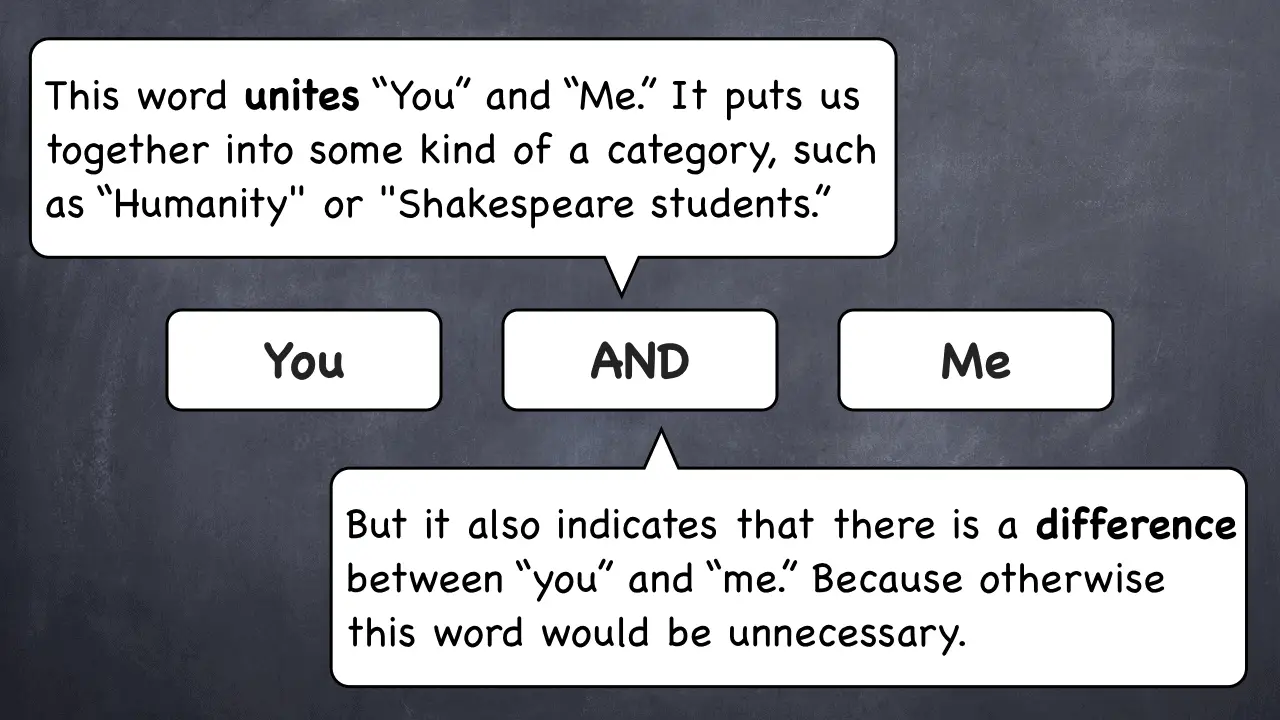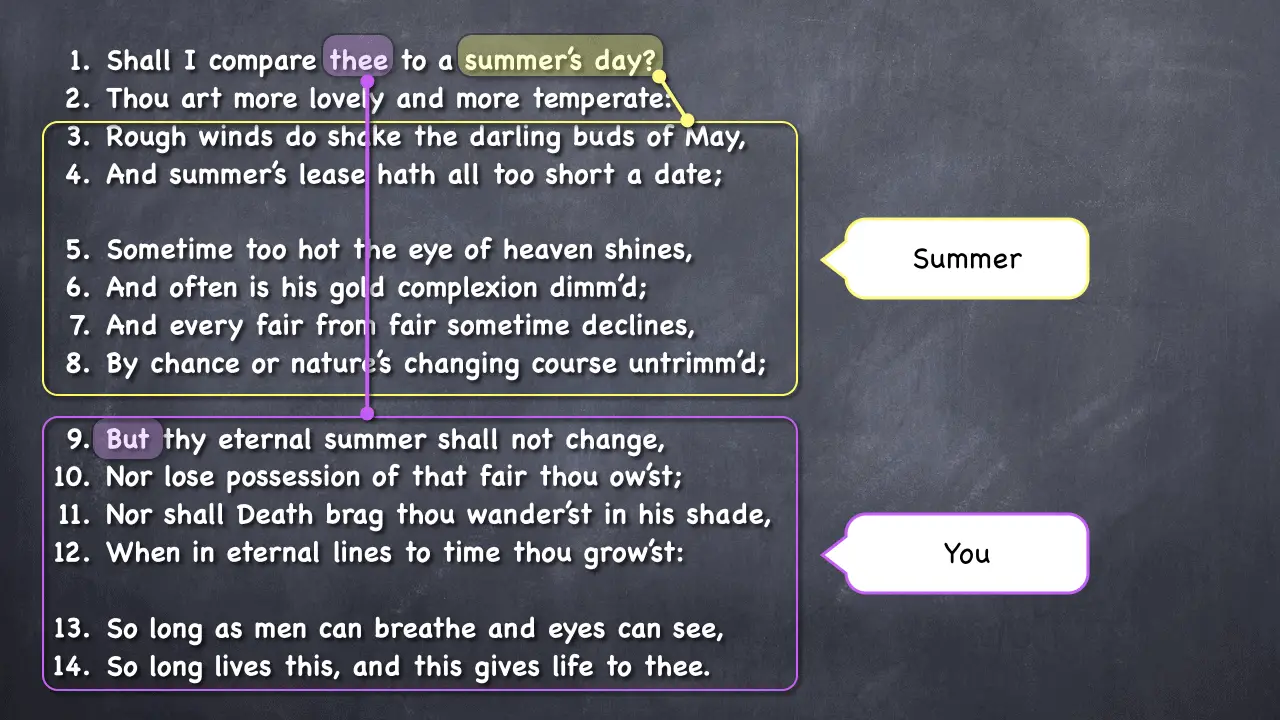
When it comes to essay writing, some words are especially powerful. I call them Power Words.
I’m Tutor Phil, and in this tutorial, you’ll harness the power of four such words. What can power words do for you? Great question!
Power words can help you:
- Get your ideas flowing
- Make a better impression on your instructor
- Organize or expand your essay
Without further ado, let’s dive in and make these power words our own!
Power Word 1: “Therefore”
What’s so special about it, and why is it a Power Word? Here’s what it does for you:
- It shows that you’ve done your homework researching the subject
- It tells the reader that you are a smart and logical person
- It adds credibility to your explanations
- If used with correct punctuation, it improves your professor’s overall impression of your writing.
So, how do we use the word “therefore?”
We use it to make a logical conclusion from a previously stated thought. For example:
“Apples contain lots of iron and are a great source of heart-healthy fiber. Therefore, apples are a healthy food.”
This word can be used in two different places within a sentence: in the beginning or in the middle. For example:
In the beginning:
“Summers fly by very fast. Therefore, every summer day should be enjoyed to the fullest.”
In the middle:
“Summers fly by very fast. Every summer day, therefore, should be enjoyed to the fullest.”
You can write it either way – both are perfectly acceptable. But here’s a bit of advice:
Alternate the two ways. Write “therefore” in the beginning of a sentence a couple of times, and the next time write it in the middle.
This is a very simple but powerful way to show your professor that you are smart and have a good taste in writing as well as good grammar skills.
Note on punctuation
When you write the word “therefore” in the beginning of the sentence, use a comma right after it, just like in the examples above.
When you write it in the middle of the sentence, just enclose it in between commas. The best place to put this word is right between the subject and the verb.
Power Word 2: “And”
The word “And” has special powers. It can unite. And it can separate. How can one word perform opposite functions?

Power word “And” is a conjunction. When you encounter it while reading, you know that it signals a separation into distinct concepts.
When you’re writing an essay, using the word “and” helps you think more clearly about your ideas.
Whenever you encounter the word “and,” you know that it connects or separates distinct bits of intellectual content.
Many permutations of this word exist. Here are some of its equivalents:
- Also
- In addition
- Furthermore
- Moreover
- Too
How can this word help you in your college writing? Here’s an example. Let’s say that your professor gives you a writing assignment, and it sounds something like this:
“Discuss Iago’s motivations and methods of persuasion in Shakespeare’s Othello.”
What does the word “and” tell you here? It tells you that you should divide this essay topic into two parts.
First, you’ll discuss Iago’s motivations.
Second, you’ll discuss his methods of persuasion.
The word “and” has just helped you structure your essay. At least you know the main sections. And all it took was noticing the word “and” in the essay prompt, and then applying it to your own essay structure.
And that’s something very useful to know about writing assignments.
Take your professors’ writing assignments literally and look for power words which can help you organize your essay.
Power Word 3: “But”
Providing a balanced perspective is a mark of a smart and experienced writer. I’ll introduce you to a word that you already know, but whose power you may not have realized until now. It will allow you to:
- Convey that you are unbiased and value other people’s opinions
- Present you as a serious writer who cares about the subject
- Expand your content even more
This Power Word is “But.”
Are you surprised? Were you hoping for something fancier than that? You don’t need fancy words to be a good essay writer. Just become a master of a few, and your writing will improve dramatically.
The word “But” acts as a partition within your reader’s mind. It is so powerful because it clearly indicates a separation into opposites. When you’re reading a difficult text, this word can help you make out its meaning.
When you’re writing, it helps you organize ideas, just like the word “and” does.
In the diagram below, you can see how Shakespeare uses this word to divide his sonnet 18 into two main sections, each about a distinct subject:

In this sonnet, Shakespeare states right in the beginning that he intends to compare “you” with the summer. And that’s exactly what he does.
The word “But” in line 9 clearly indicates a separation into sections. Section one (lines 1-8) is about the summer, and section two (lines 9-14) is about “You.”
I actually made a video in which I analyze the sonnet in detail. I highly recommend that you watch it to see power words in action. Here it is:
Here are some of the equivalents of the word “But”:
- However
- Nevertheless
- Still
- Yet
- Unfortunately
- Nonetheless
And here is my video about the Power Words “And” and “But,” if you like video lessons:
Power Word 4: “Since”
Each power word works differently. The word “since” has a couple of meanings, but we’re interested in only one – it is essentially an equivalent of the word “because.”
Let me give you an example.
“Since I knew I would be free on the weekend, I agreed to participate in the rally.”
Or…
“Since you’re now a college student, you should be more organized.”
In these cases, the word “since” works pretty much like the word “because.” For example, you could say,
“Because I knew I would be free on the weekend, I agreed to participate in the rally.”
It’s just a bit more elegant to use the word “since” instead of the word “because” when using it in the beginning of a sentence.
How would you use it to give yourself a boost of creativity?
It’s very easy. When you feel you’re stuck and out of ideas, simply start a new sentence and write the first word: “Since…”
Remember – any sentence that begins with “since” must have two parts: the fact and what follows from that fact. Let’s look at this sentence again:
“Since I knew I would be free on the weekend, I agreed to participate in the rally.”
Here, the first part is “I knew I would be free on the weekend.” This is the fact. I knew I would be free. In my mind, it is a fact.
Now, here’s the second part: “I agreed to participate in the rally.” This is what follows from that fact. Since I knew I’d be free, I agreed to participate.
In other words, part two is logically dependent on part one. If I am free, I can participate.
Please note that each of the parts is a complete sentence with its own subject and verb.
“I knew” – these are a subject and a verb.
“I agreed” – these are a subject and a verb, as well.
Here’s your formula for using the power word “Since”:
Since [Part 1], [Part 2].
And here’s the formula in more detail:
Since [Subject 1 + Verb 1], [Subject 2 + Verb 2].
You can use this formula whenever you hit the writer’s block. Here’s exactly how to break through.
Step 1. Simply start a new sentence by writing or typing the word “Since…”
Step 2. Now your brain is looking for the fact to state because it knows that it needs one. And it will find it:
“The weather is nice.”
Or,
“It’s hard to find a good plumber.”
Whatever is relevant to your essay and to the particular section in it – write it down.
Step 3. Now your brain is already on the lookout for what follows from that fact. So, just come up with the logical conclusion you’re making from it:
“Since the weather is nice, we could go to the beach.”
“Since it’s hard to find a good plumber, I might as well just fix the faucet myself.”
See how this works? Once you’ve practiced this a few times, your brain will know exactly what to do to produce quality material every time you start a new sentence with the power word “since.”
By the way, I created a video lesson on this power word. Here it is:
Make these power words your own and watch your grades go up!
Tutor Phil
